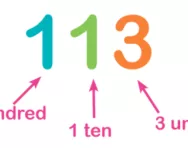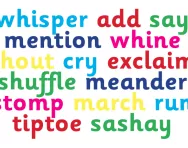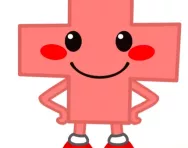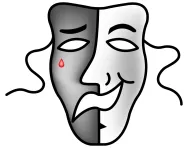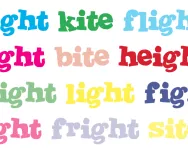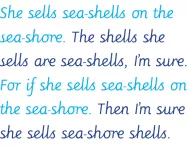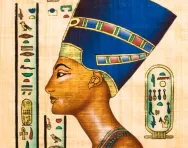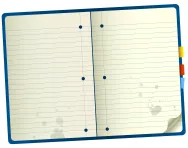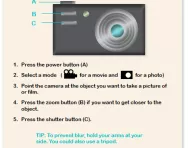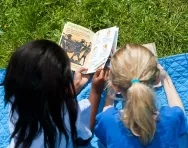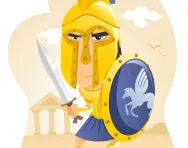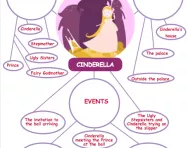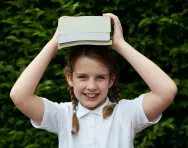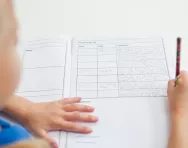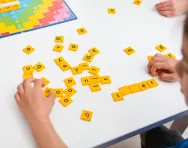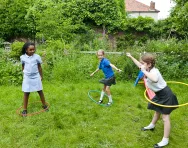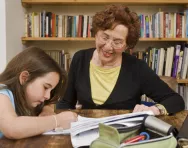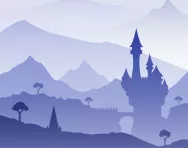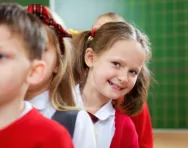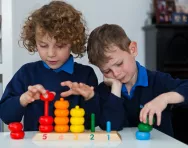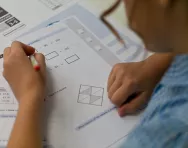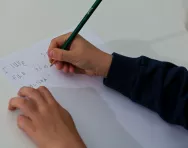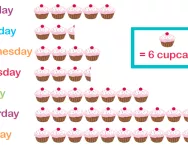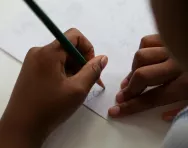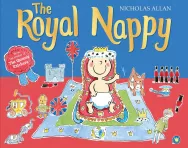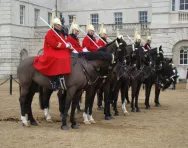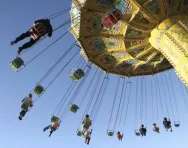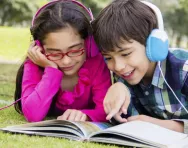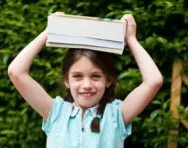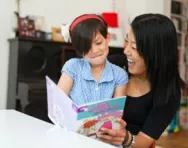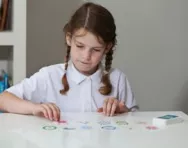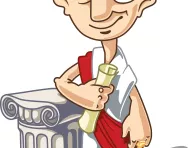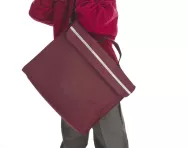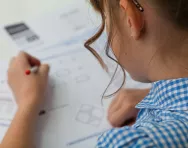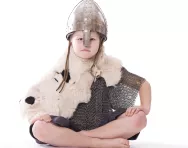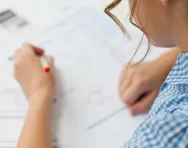What is place value?
A good understanding of place value (the value of each digit in a number) is vital in primary-school maths. Our parents' guide explains how your child will be taught about ones, tens, hundreds and thousands with number lines, arrow cards and more, as well as outlining how place value is used to help children visualise calculations.
What is subtraction on a number line?
Also known as the jump strategy or complementary addition, subtraction on a number line is a common technique in KS1 and KS2 maths, useful for helping children visualise that subtraction is finding the difference between two numbers. Teacher Alice Hart explains the method and how it's taught in primary school maths.
What are powerful verbs?
Using powerful, descriptive verbs can make a big difference to your child's writing. We explain what parents need to know about powerful verbs (and ordinary verbs!) when helping with primary-school homework.
Teachers' tricks for addition
Help your child with their addition work, from the basics in Reception to calculations in KS1 and KS2, with some teachers' tricks to help the learning stick.
What is a play script?
Children learn to read, write and perform play scripts as part of the English and drama curriculum in primary school. Find out about the features of this genre, as well as ways to support your child's learning at home.
What is rhyme?
From reading rhyming poems to identifying rhyme schemes and rhyming couplets, we explain everything you need to know to help you support your child's love and learning of poetry at home.
What are alliteration, assonance and consonance?
When analysing poetry your primary-school child might mention alliteration, assonance and consonance. We explain what they've been taught to look out for in literacy lessons.
What is an information text?
Information texts are an important part of primary school literacy lessons. We explain the features of this non-fiction genre, why note-taking matters and how to help your child at home.
What is a recount?
Has your child been asked to write a recount? Find out what the main features of this kind of non-fiction text are, plus how recounts are used in primary school literacy lessons.
What is argument text?
Argument texts are studied and written in KS2 literacy. We explain the features to look out for in this non-fiction genre and how to help your child structure and write their own argument text correctly.
What is instruction text?
We read instruction texts on an everyday basis. In primary school your child will be taught to recognise the main features and write increasingly complicated instruction texts as part of their non-fiction literacy work.
What is non-fiction?
Non-fiction texts are read, studied and written throughout the primary-school years. Our parents' guide covers instruction texts, recounts, information and explanation texts, persuasive writing and argument texts and explains what you need to know to support your child.
What are myths and legends?
Myths and legends are taught as part of the primary-school curriculum; as well as reading them your child will probably write their own version. We explain what parents need to know to support learning at home.
What is creative writing?
Children are encouraged to read and write a range of genres in their time at primary school. Each year they will focus on various narrative, non-fiction and poetry units; we explain how story-writing lessons help develop their story structure, grammar and punctuation skills.
What is a spider diagram?
Spider diagrams are common planning tools in the primary-school classroom, used in science as well as literacy. We explain what you need to know to help your child use a spider diagram when preparing a fiction or non-fiction piece of writing.
The primary school National Curriculum in England explained for parents
TheSchoolRun explains everything parents need to know about the National Curriculum for English primary schools.
Book reports: what parents need to know
Helping your child engage with their reading matter and improve their literacy skills, book reports are a homework staple. So what’s involved, and how can you make them easier for your child? Lucy Dimbylow explains.
The parents’ guide to after-school childcare: out-of-school clubs
Convenient and cost-effective, out-of-school clubs can be a good solution to the before- and after-school childcare dilemma. So what do you need to know before you sign up?
The parents’ guide to after-school childcare: childminders
With a home-from-home environment and smaller numbers than an after-school club, childminders are a popular choice for after-school childcare. Here’s what you need to know.
The parents’ guide to after-school childcare: relatives
Getting a grandparent or other family member to provide after-school childcare can be a dream come true – or a bit of a nightmare. Lucy Dimbylow looks at the pros, cons and practicalities.
What is a story setting?
Every story has a setting, and primary-school children learn to analyse story settings in other people's writing before using the same techniques in their own fiction writing. Read on for details of how story settings are taught in KS1 and KS2.
What is an academy?
More and more primary schools in England are converting to academy status. If your child’s school is planning to make the transition, what could it mean for them?
Does my child have dyscalculia?
What are the signs to look out for if you think your child might have dyscalculia or 'number blindness', and what can be done to help?
7 strategies to help defeat children’s fear of maths
What does it mean if your child has a fear of maths, and what can you do to help them get over it? TheSchoolRun offers a step-by-step plan to help you boost your child's confidence – and your own.
Dyspraxia: parents' questions answered
Dyspraxia, or Developmental Co-ordination Disorder (DCD), causes problems with language, perception and thought – most specifically issues with co-ordination. Around one in seven children has this learning difficulty and if your child is affected it can be hard to know how to help for the best. Here we answer some of the most common questions parents ask.
What is a pictogram?
Pictograms are introduced in Year 2 as a simple and engaging introduction to bar charts. We explain what your child needs to know about pictograms and how to read and create them, as well as explaining when and how they're taught.
What are inverse operations?
Inverse operations are opposite operations – one reverses the effect of the other. In primary maths we talk about the inverse to explain how addition and subtraction are linked and how multiplication and division are linked. Teacher Alice Hart offers examples of how and when your child will be asked to use the inverse operation in school, and practical ways to help them understand the concept.
Your child's new school year preparation plan
Each year group brings fresh challenges in literacy and numeracy. Want to give your child a head start? Primary teacher Phoebe Doyle offers some easy-to-action advice on tackling an objective from the year group your child is about to enter during the summer break.
10 of the best children's books for summer 2013
Mysteries, thrillers, supernatural tales and chick lit – we all want to pack a good book to read on holiday, whether we’re 4 or 104! From historical fiction to the new laugh-out-loud classic from Jeremy Strong, this super selection of books for KS2 readers means the whole family can have a fiction-packed break.
3 of the best Royal London experiences for primary-school children
Our capital city is soaked in royal references and history, and it is hard to visit anywhere that isn’t connected with royalty in some way, but a few very special places really bring the pageantry and tradition of the monarchy to life for KS1 and KS2 children. Enjoy a right royal day in London with tips from Francesca Fenn of Step Outside Guides.
Holiday learning in theme parks, museums and on the move
Holidays are anything but an education-free-zone says Phoebe Doyle, teacher and mum. Make the most of your children's experiences outside the classroom by turning them into literacy and numeracy learning adventures.
Listen and learn: why audiobooks are great for your child
Whether your child is a voracious reader or is horrified at the suggestion of picking up a book, audiobooks could have some surprising benefits. Lucy Dimbylow explains how they could boost literacy skills, and shares our pick of the best to get you started.
Learning tips for kinaesthetic learners
To you, they might look like a fidget, but your child’s restlessness could actually be helping them learn. Find out more about the theory of kinaesthetic learners and how learning styles might be discussed during your child's time at primary school.
How to help your auditory learner
If your child prefers reading aloud, is always talking to themselves and provides a running commentary of everything they do, they could be an auditory learner. We explain what the learning styles theory suggests and why you might hear about t during your child's time at primary school.
Is your child a visual learner?
Does your child have an obsession with highlighters, or spend hours looking at YouTube videos about their latest class topic? They might be a visual learner. Read our guide to the theory of learning styles and how it might be mentioned during your child's time at primary school.
Cool classics: Latin and Ancient Greek at primary school
If your child is often heard incanting Harry Potter spells, he’s probably familiar with a few Latin words already. But could Latin or Ancient Greek be on his school syllabus next year? Lucy Dimbylow looks at the benefits of learning classics, and how to get started at home.
17 things you don't want to find in your child's bookbag
Buying your child’s first bookbag and seeing them carrying it proudly when they start school is a special moment. And it can be wonderful when they use it to bring home great ‘masterpieces’ that they have produced in the classroom. But before you know it, the bag has got covered in mud, drink stains and felt tip, the Velcro has stopped sticking, and holes have appeared in the corners. And you soon start to dread what you might discover when you open it... Rachael Newman-Sanders peeks inside.
What are national curriculum levels?
In the past, primary school children taking SATs were given their results as a National Curriculum level. But what did these numbers actually mean? Lucy Dimbylow explains the grading system used in primary schools until September 2014 in parent-friendly language.
No-sew history costumes
Another week, another costume… that’s the way it feels sometimes! Non-crafty mum Phoebe Doyle has some no-sew, no-stress ideas to help you create a simple, effective costume for History Week at school, whether your child needs to look medieval, prehistoric or Victorian.
National Reading and Numeracy Tests explained for parents
All children in Wales from Y2 to Y9 take tests in reading and numeracy at the end of each school year. Find out what these tests involve, and how you can help your child prepare for them.
